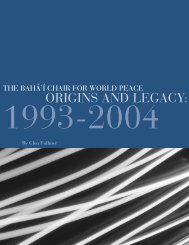who medicines strategy - libdoc.who.int - World Health Organization
who medicines strategy - libdoc.who.int - World Health Organization
who medicines strategy - libdoc.who.int - World Health Organization
You also want an ePaper? Increase the reach of your titles
YUMPU automatically turns print PDFs into web optimized ePapers that Google loves.
WHO MEDICINES STRATEGY 2004-2007 | 84From the outset, WHO has worked to establishand promote <strong>int</strong>ernational standards for thequality of pharmaceuticals. Under Article 2 of theWHO Constitution, WHO is required to “develop,establish and promote <strong>int</strong>ernational standardswith respect to food, biological, pharmaceuticaland similar products”.Without assurance that <strong>medicines</strong> are relevantto priority health needs and that they meetacceptable standards of quality, safety, andefficacy, any health service is evidentlycompromised. In developed countries,considerable administrative and technical effort isdirected to ensuring that patients receive effective<strong>medicines</strong> of good quality. It is crucial to theobjective of health for all that a reliable system of<strong>medicines</strong> control is brought within the reach ofevery country.The existence of <strong>int</strong>ernational harmonizationinitiatives in different parts of the worlddemonstrates the importance that governmentsattach to drug regulation; at the same time, itoffers opportunities for countries to review andimprove their regulatory systems. 42Member States continue to look to WHO forguidelines on the development of pharmaceuticalregulation, legislation, and quality assurance.In response, the WHO Expert Committee onSpecifications for Pharmaceutical Preparationshas adopted a large number of guidelines <strong>int</strong>he area of quality assurance 43 . Guidelines havebeen adapted by Member States or regionalharmonization groups to meet their own needsand circumstances.Another critical pharmaceutical serviceprovided by WHO is the system of InternationalNonproprietary Names (INN), which is used toidentify each pharmaceutical substance or activeingredient by a unique and universally accessiblename. This function is fundamental to ensurethat dispensing and prescribing is governed by acommon nomenclature allowing communicationamong health professionals and consumers.This is of increasing importance in view of theglobalization of trade in pharmaceuticals and theneed for better communication among healthprofessionals. The existence of several names forthe same product can be a source of confusionand a potential risk to health.The WHO Expert Committee on Specificationsfor Pharmaceutical Preparations meets regularlyand publishes statements, guidelines, andrecommendations that provide the tools for











